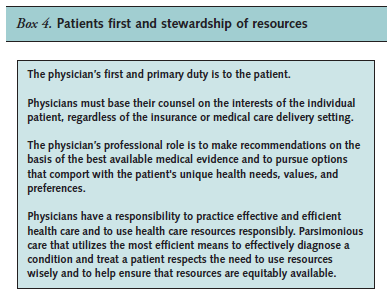My 2¢ on parsimony
There’s been a bit of a buzz following the release of the latest edition of the ACP’s Ethics Manual. For the first time, it seems, the manual includes a section on “stewardship of resources” with directives summarized in Box 4.
The Left hailed the new change as “truly remarkable” and an important first step to “break the logjam” of health care deficits, while the Right was quick to denounce the set of instructions as an “ethical game-changer,” a surreptitious undermining of the doctor-patient relationship, or an overt step toward health care rationing.
I have no doubt that the collectivists who hail this “important shift” do so in the hope of promoting a kind of herd medicine which conforms to their vision of a modern health care system. I am also aware that advocates of central planning have no particular qualms about trampling on the fiduciary duty of doctors to patients, and will embrace the ACP directives as a convenient cover to justify their ill-advised health policies.
Yet Box 4 is a perfectly acceptable set of declarations in-and-of itself.
Physician oaths, whether ancient or modern, have always contained an unqualified pledge to serve the patient. The service is not expected to be free, but professional ethics imply that the patient’s resources be respected, that the doctor should provide “parsimonious care” (and I have no objection to the use of the term).
But the difficulty arises because for the last 50 years physicians and patients have mindlessly consented to placing their relationship in grave jeopardy. By allowing and enjoying a medical care paid for by others, they have explicitly entered into a very problematic ménage-à-trois: the doctor, the patient, and the purser. And if cost-effectiveness is indeed an implicit duty for all physicians, the question becomes: cost-effective for whom?
The ethical dilemma ultimately proceeds from the modern physician serving two masters. He may well proclaim to love the one and hate the other, to avoid bondage to Mammon he must cleanly cut the tie.
The ACP ethicists miss the elephant in the room when they declare in a paragraph precisely headed “Third Party Evaluations” that
Performing a limited assessment of an individual on behalf of a third party, for example, as an industry employed physician or an independent medical examiner, raises distinct ethical issues regarding the patient–physician relationship. The physician should disclose to the patient that an examination is being undertaken on behalf of a third party that therefore raises inherent conflicts of interest; ensure that the patient is aware that traditional aspects of the patient–physician relationship, including confidentiality, might not apply…
Snyder et al. are oblivious that the warnings they issue pertain to most insurance-paid medicine. At a fundamental level, all physicians who sign a contract with a third-party payer are ‘industry-employed,’ and that is the crux of the matter.
The rest of the ACP document seems to be standard fare modern day ethics with the expected materialistic or dualistic biases.
Physicians seeking an organization on more solid ethical grounding should look to the AAPS instead and browse its current and old websites.
[callout]If you enjoy what you read, don’t forget to share the content with your friends so they too can become Alert and Oriented! Also, sign-up at the upper right-hand corner of your browser (or at the bottom of the page on mobile devices) to receive a free monthly digest of all my posts . Thank you! [/callout]

Yes , the ACP has taken a “bold stand”. Dr. Fogoros’s third installment of the book he is writing in increments on his blog (The Covert Rationing BLog ) seems to really nail the events and driving forces of the gradual demolition of traditional medical ethics.
James
Thanks, James. Dr. Rich is an astute chronicler of our recent demise, but I also think we are getting “blowback” for what earlier generations of physicians agreed to get take part of for their short term benefit.